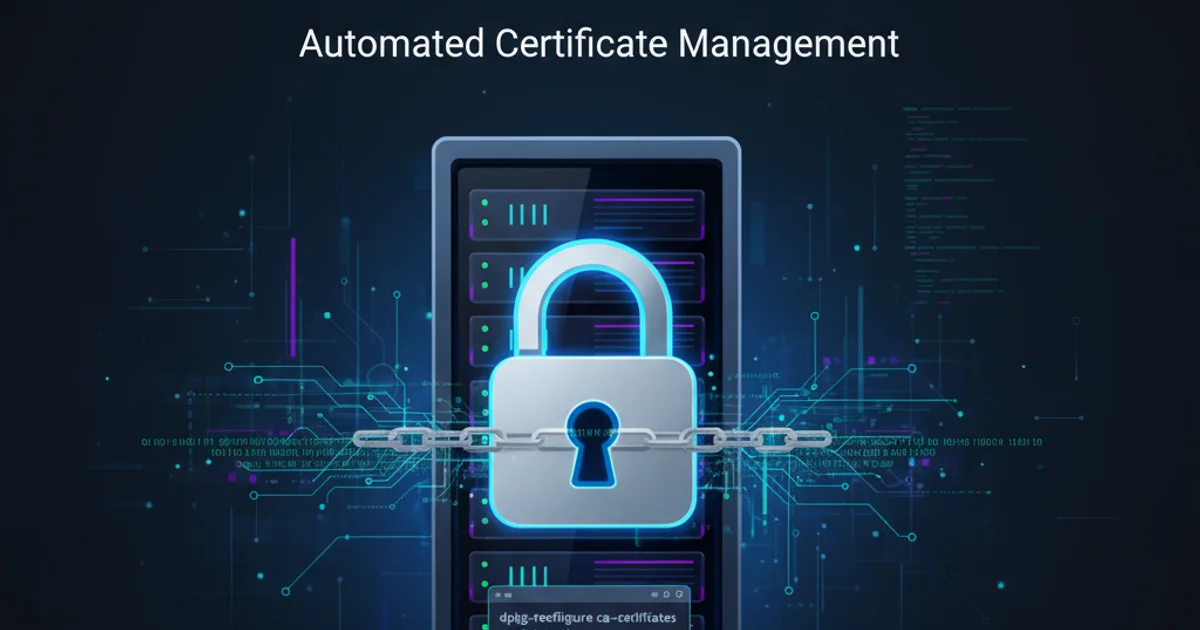How to run "dpkg-reconfigure ca-certificates" noninteractively?
Categories:
Running dpkg-reconfigure ca-certificates Non-Interactively

Learn how to automate the configuration of CA certificates on Debian/Ubuntu systems, bypassing interactive prompts for seamless scripting and deployment.
The ca-certificates package on Debian and Ubuntu systems manages the system-wide store of trusted Certificate Authority (CA) certificates. When you install or update this package, it often triggers dpkg-reconfigure ca-certificates, which by default presents an interactive dialog to the user. This interactive behavior can be problematic in automated environments like shell scripts, Dockerfiles, or CI/CD pipelines where user input is not feasible. This article will guide you through various methods to run dpkg-reconfigure ca-certificates non-interactively, ensuring smooth and automated certificate management.
Understanding the Interactive Prompt
The interactive prompt for dpkg-reconfigure ca-certificates typically asks which certificates should be trusted. It presents a list of certificates, allowing the user to select or deselect them. For most automated scenarios, the goal is usually to accept the default selections or to explicitly trust a specific set of certificates without manual intervention.
flowchart TD
A[Start Automation Script] --> B{Install/Update ca-certificates?}
B -- Yes --> C[dpkg-reconfigure ca-certificates triggered]
C -- Default (Interactive) --> D{User Input Required?}
D -- Yes --> E[Script Halts/Fails]
D -- No (Non-Interactive) --> F[Script Continues Seamlessly]
B -- No --> F
F --> G[End Automation Script]Flowchart illustrating the impact of interactive prompts on automation scripts.
Method 1: Using DEBIAN_FRONTEND=noninteractive
The most common and recommended way to handle interactive Debian package configurations is by setting the DEBIAN_FRONTEND environment variable to noninteractive. This tells dpkg and related tools to use default answers for any questions, effectively bypassing interactive prompts.
sudo DEBIAN_FRONTEND=noninteractive dpkg-reconfigure ca-certificates
Running dpkg-reconfigure ca-certificates non-interactively.
ca-certificates.Method 2: Pre-seeding Answers with debconf-set-selections
For more granular control or when DEBIAN_FRONTEND=noninteractive doesn't provide the desired defaults, you can pre-seed answers to debconf questions. This involves providing a file or direct input to debconf-set-selections with the specific answers for the package's configuration questions. While ca-certificates typically doesn't have complex questions, this method is powerful for other packages.
# Example: Pre-seeding a default selection (usually not needed for ca-certificates)
echo "ca-certificates ca-certificates/update-certificates boolean true" | sudo debconf-set-selections
sudo dpkg-reconfigure ca-certificates
Using debconf-set-selections to pre-seed answers before reconfiguring.
debconf questions and their possible answers can be tricky. You can often find them by running the configuration interactively once and observing the prompts, or by inspecting the package's templates file (e.g., in /var/lib/dpkg/info/ca-certificates.templates).Method 3: Combining with apt-get for Automated Installs
When installing or upgrading packages that might trigger dpkg-reconfigure, you can combine DEBIAN_FRONTEND=noninteractive directly with your apt-get commands.
sudo DEBIAN_FRONTEND=noninteractive apt-get update
sudo DEBIAN_FRONTEND=noninteractive apt-get install -y ca-certificates
Automating installation of ca-certificates with non-interactive frontend.
This ensures that any configuration steps during the installation process are handled non-interactively. This is particularly useful in Dockerfiles or provisioning scripts.
Verifying Certificate Configuration
After running dpkg-reconfigure ca-certificates non-interactively, you might want to verify that the certificates have been updated correctly. The system's trusted CA certificates are typically stored in /etc/ssl/certs/ and managed by update-ca-certificates.
ls -l /etc/ssl/certs/ | grep -i "mozilla"
update-ca-certificates --fresh
Commands to list installed certificates and force an update.
The update-ca-certificates --fresh command rebuilds the /etc/ssl/certs/ca-certificates.crt bundle from the individual certificates in /usr/share/ca-certificates and /etc/ca-certificates/update.d/.